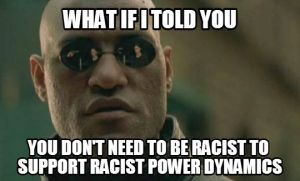I’m going to be honest here – I’ve had a hard time writing this post. Every time over the past week that I have sat down to put emotions and personal comprehension into words, all of those things that I feel about race and racism well up in my brain and leave me unwittingly mute on the subect. For the sake of this assignment, however, I’ll try to get over it.
Culture is an imagined thing. If you put a child in a room with no stimuli and raised it there for its entire life without external influences to affect its behavior, culture would not magically appear (although DYFS hopefully will, because that’s a horrible thing to do). Race, like culture, is something that cannot exist in a vacuum. It takes two to tango, or so they say. In terms of race and racism, it takes two people of unequal power, the oppressed and the oppressor, to create a distressing mess of systematic and structural prejudice. It is a system of violence that is tempered with the fact that cohabitation happens and that standards of public morality are constantly shifting and being challenged.
In Touré’s “Forty Million Ways to be Black,” the author describes “post-racial” as making race invisible and not addressing it. In his rejection, the author instead employs the use of the word “post-Black,” largely because the term is more suited to his discussion and because a reframing of the word “post-racial” is a mammoth mission that may be impossible to achieve. Touré explains the potential of the term “post-Black”, saying that “Most terms have a confining aspect to them but post-Black is not a box, it’s an unbox. It opens the door to everything. It’s open-ended and open-sourced and endlessly customizable. It’s whatever you want it to be” (Touré 12).
Given that America has been built and is continuing to flourish on systems that exploit the unequal relationships between people to produce profit, and given that greed is not a negligible aspect of human behavior, I believe that becoming a post-Black (or post-racial, for our purposes) country is a goal that will take a lot of long, hard-fought progress.
Touré quoted Dr. Michael Eric Dyson in saying, “The moment we shatter those artificial encumberances of race – a stereotype from without or a rigid archetype from within – and feel no need to respond to either is the moment we are vastly improved, profoundly human, and therefore become the best Black people we can become. And we maximize our humanity. I mean, the irony is, the greater we maximize our humanity the greater our Blackness becomes” (5).
If this is our goal, then American culture and society has a long way to go before achieving it (which is good, because if I said that this were something we’re close to achieving, we’d really be half-assing it). Fear not though, because hope is on the horizon. As technology connects previously unconnected voices of hate (Trigger Warning for this link: leads to a horribly offensive, racist, infuriating song which is a favorite of Rush Limbaugh’s featuring the POTUS), it also creates a global network of people willing to call out racism, or other modes of oppression, when they see it and begin honest discussions about things that matter. For example, last August’s Twitter trend of #solidarityisforwhitewomen quickly went viral and began conversations on gender, race, sexuality, and intersectional identities that might never have started without its presence and inspiring and meaningful messages for social justice like those found in this TED Talk reach far and wide.

